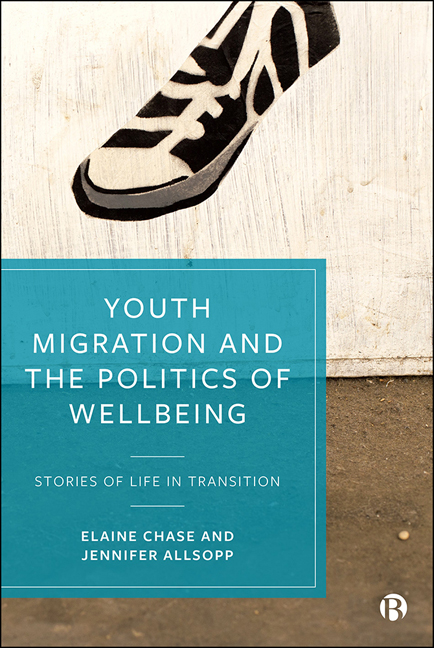Book contents
- Frontmatter
- Contents
- List of Figures
- Acknowledgements
- Foreword
- ‘Future’
- 1 Introduction
- 2 Conceptualizing Wellbeing in the Context of Migration and Youth Transitions
- 3 Capturing Wellbeing in Transition: An Alternative Approach
- 4 ‘Iron Rod’ or ‘Colander’? Welfare Regimes in England and Italy
- 5 The Pursuit of Safety and Freedom
- 6 Legal Integrity and Recognition
- 7 Identity and Belonging
- 8 Constructing Viable Futures as ‘Adults’
- 9 Emotional and Mental Wellbeing
- 10 Friendships, Connections and Relationships
- 11 Transnational Family and Connections
- 12 Conclusion
- Endnotes
- References
- Index
7 - Identity and Belonging
Published online by Cambridge University Press: 21 April 2021
- Frontmatter
- Contents
- List of Figures
- Acknowledgements
- Foreword
- ‘Future’
- 1 Introduction
- 2 Conceptualizing Wellbeing in the Context of Migration and Youth Transitions
- 3 Capturing Wellbeing in Transition: An Alternative Approach
- 4 ‘Iron Rod’ or ‘Colander’? Welfare Regimes in England and Italy
- 5 The Pursuit of Safety and Freedom
- 6 Legal Integrity and Recognition
- 7 Identity and Belonging
- 8 Constructing Viable Futures as ‘Adults’
- 9 Emotional and Mental Wellbeing
- 10 Friendships, Connections and Relationships
- 11 Transnational Family and Connections
- 12 Conclusion
- Endnotes
- References
- Index
Summary
Introduction
We were in the pub watching football as Sayel pulled out his phone and showed us the footage of the English Defence League (EDL) marching on the town he now called home. Sayel didn't drink beer when he first arrived, but he now enjoyed an occasional pint after work. ‘OMG, I’m so British,’ he quipped. ‘Don't tell my mum!’ His fellow Afghan friend who was with us did not consume alcohol. He said he felt a bit uneasy in the pub in case he was seen and people assumed he was drinking, but it was, he added, worth it to see the football on the big screen.
In the video, Sayel is heard telling the nationalists to ‘go back to your city’; ‘we don't want you here’. The crowd of EDL members who have bussed in from across the United Kingdom (UK) are met by a throng of anti-fascists, several whom are migrants including Sayel. ‘I’m just like, piss off mate,’ he explained. ‘This is our city … and most of those EDL guys aren't even from around here!’
Like Sayel, the young people we met throughout the research often had an immense sense of pride in the cities and localities they had come to call home. In anthropological terms, this can be seen as ‘placemaking’ – the transformation of living spaces into places that feel like home (Massey 1998). The new immigrants supported their local football teams, university reputations and, well, London was London – living there a source of pride in and of itself given its place in the global imaginary. When they arrived, a few young people already had distant family or friends in the country and basic language skills. But for all of them, a key part of settling into their new environments was to build relationships to support and sustain them (see Chapter 10).
While seeking to belong in their new homes, young people from all countries simultaneously maintained a sense of duty to ‘give back’ to their home countries. For some this was in real time through remittances or other forms of transnational support, while others imagined futures in which they would be in a position to help rebuild communities as doctors, nurses, pharmacists, lawyers or business investors.
- Type
- Chapter
- Information
- Youth Migration and the Politics of WellbeingStories of Life in Transition, pp. 113 - 134Publisher: Bristol University PressPrint publication year: 2020

